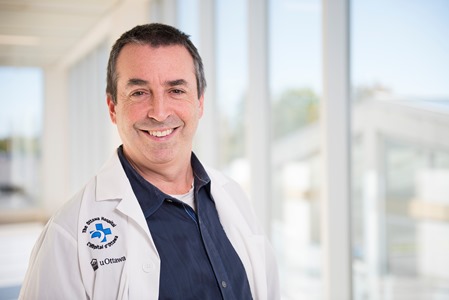Newsroom
Using viruses to fight viruses: new approach eliminates “dormant” HIV-infected cells
décembre 18, 2017
 While Ottawa researchers are known for their work on cancer-fighting viruses, one team is applying these viruses to a new target: HIV.
While Ottawa researchers are known for their work on cancer-fighting viruses, one team is applying these viruses to a new target: HIV.
Researchers at The Ottawa Hospital and the University of Ottawa have discovered that the Maraba virus, or MG1, can target and destroy the kind of HIV-infected cells that standard antiretroviral therapies can’t reach. This laboratory discovery was published in the Journal of Infectious Diseases. If this technique works in humans, it might possibly contribute to a cure for HIV.
While daily medications keep the level of HIV virus in the blood low, there is currently no way to totally eliminate dormant HIV-infected cells from the body. If a person living with HIV stops taking antiretroviral medications, these hidden viruses rapidly rebound.
These latently HIV-infected cells are hard to target because they are not distinguishable from normal cells. Dr. Jonathan Angel and his team tried a new approach of identifying these dormant cells by using the MG1 virus. This virus attacks cancer cells that have defects in their interferon pathway, which makes the cells more vulnerable to viruses. Dr. Angel and his team previously found that latently HIV-infected cells also have defects in this pathway.
“We thought that because latently HIV-infected cells had similar characteristics to cancer cells, that the virus would enter and destroy them,” said Dr. Angel, senior scientist and infectious disease physician at The Ottawa Hospital, and professor at the University of Ottawa. “It turns out we were right.”
Using a number of laboratory models of latently HIV-infected cells, the researchers found that the MG1 virus targeted and eliminated the infected cells, and left healthy cells unharmed.
While most of these cells in patients are in the lymph nodes and other organs, a tiny number are found in the blood. When the researchers added MG1 to relevant blood cells taken from HIV-positive individuals, the levels of HIV DNA in the sample dropped. This indicated that the HIV-infected cells had been eliminated.
“We know that the Maraba virus is targeting and killing the latently HIV-infected cells, but we don’t know exactly how it’s doing this,” said Dr. Angel, who is also Head of the Division of Infectious Disease. “We think the virus is able to target the cells because of an impaired interferon pathway, but we need to do more research to know for sure.”
The research team’s next step is to try the virus in animal models of HIV or move directly to clinical trials pending funding and approvals.
All research at The Ottawa Hospital is supported by generous donors who contribute to hospital priorities, including research to improve patient care and a research chair in gay men’s health. The study was also funded by the Department of Medicine, University of Ottawa, Canadian Institutes of Health Research, Canadian Foundation for AIDS Research.
Full reference: “The oncolytic virus, MG1, targets and eliminates latently HIV-1-infected cells: implications for an HIV cure.” Nischal Ranganath, Teslin S. Sandstrom, Stephanie C. Burke Schinkel, Sandra C. Côté, Jonathan B. Angel. Journal of Infectious Disease. December 8, 2017.
The Ottawa Hospital: Inspired by research. Driven by compassion
The Ottawa Hospital is one of Canada’s largest learning and research hospitals with over 1,100 beds, approximately 12,000 staff and an annual budget of over $1.2 billion. Our focus on research and learning helps us develop new and innovative ways to treat patients and improve care. As a multi-campus hospital, affiliated with the University of Ottawa, we deliver specialized care to the Eastern Ontario region, but our techniques and research discoveries are adopted around the world. We engage the community at all levels to support our vision for better patient care. See www.ohri.ca for more information about research at The Ottawa Hospital.
University of Ottawa: —A crossroads of cultures and ideas
The University of Ottawa is home to over 50,000 students, faculty and staff, who live, work and study in both French and English. Our campus is a crossroads of cultures and ideas, where bold minds come together to inspire game-changing ideas. We are one of Canada’s top 10 research universities—our professors and researchers explore new approaches to today’s challenges. One of a handful of Canadian universities ranked among the top 200 in the world, we attract exceptional thinkers and welcome diverse perspectives from across the globe. www.uottawa.ca
Media Contact
Amelia Buchanan
Senior Communication Specialist
Ottawa Hospital Research Institute
ambuchanan@ohri.ca
Office: 613-798-5555 x 73687
Cell: 613-297-8315
@OttawaHospital
